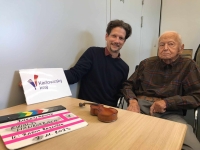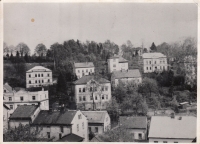I never returned to Luby after the deportation, not even for a visit
Stáhnout obrázek
Ewald Hannabach was born in Luby near Cheb on 1 January 1930 into a German family as the second son of Arthur Hannabach who was a prominent musical instrument dealer. The family business was founded by his great-grandfather Anton Hannabach, and the family had a large house with a string and musical instrument factory. Ewald went to primary school first in Luby and then to a higher stage in Cheb. The family remained neutral after 1938; the father did not enlist in the German army due to bad health and elder brother Gerold was drafted into the anti-aircraft artillery unit in January 1945. Ewald apprenticed as a musical instrument maker at the neighboring Lang company from 1944 to 1946, often running errands for the foreman. These were offten quite adventurous because at that time finished instruments and production equipment was being transported to Germany illegally. The production of musical instruments in the workshops in Luby continued until the summer of 1946 when most of the German inhabitants were deported. Ewald, his parents and grandmother were also deported to Bavaria. They continued making musical instruments in Bubenreuth, Bavaria, especially father Arthur and brother Gerold who became a world-famous master grade guitarmaker. Ewald eventually took a job with Siemens, became a technician and engineer and was in charge of various projects in Europe and elsewhere. He considered the deportation to be such a major turning point in his life that he never returned to Luby.

